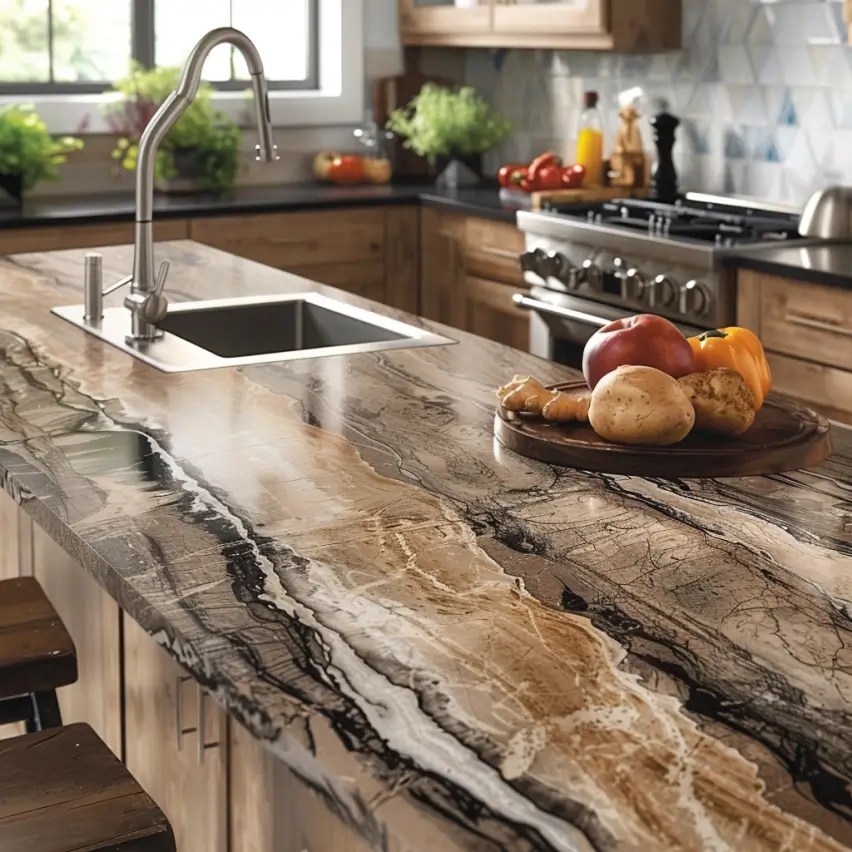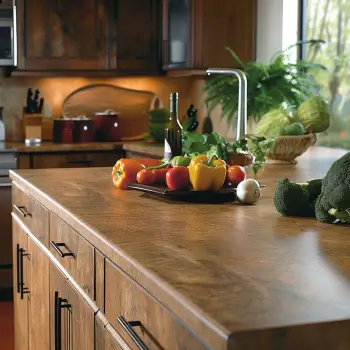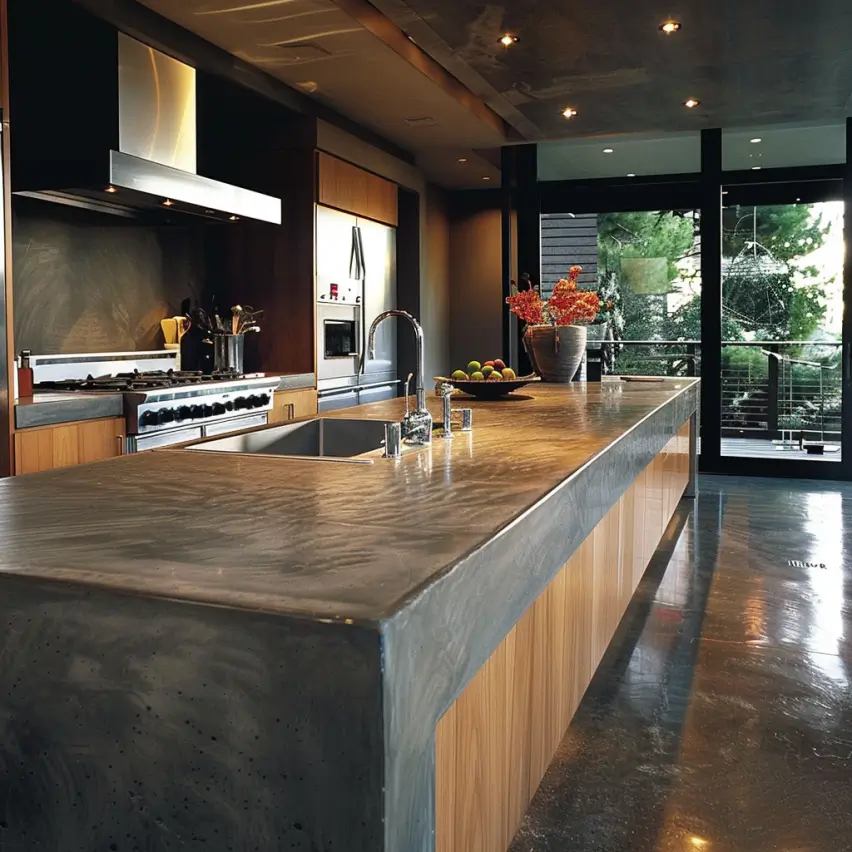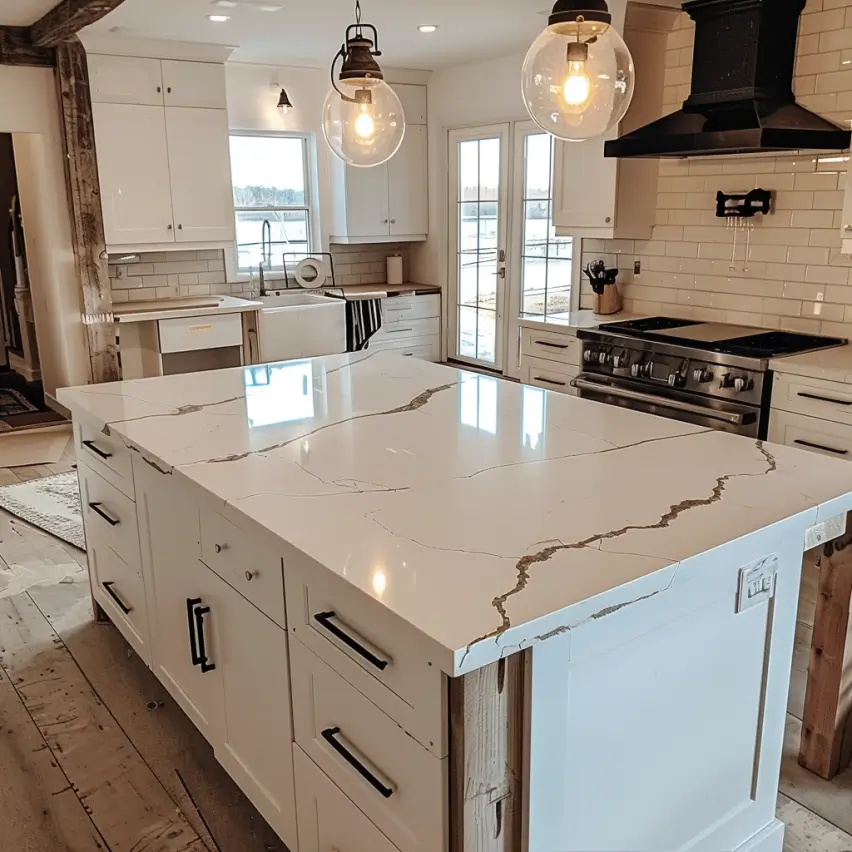Best Countertops for Farmhouse Style – Pros & Cons
As a homeowner, you want to select a countertop that not only complements your kitchen’s aesthetic but also fits your budget and lifestyle.
In this article, I will discuss some of the best countertops for farmhouse-style kitchens, along with their pros and cons.

One popular option for farmhouse-style kitchens is concrete countertops.
Concrete has an industrial look that works well with the rustic charm of a farmhouse kitchen. It is also affordable if you choose to DIY it.
However, it’s important to note that concrete countertops can be tricky to install, so it’s best to leave it to seasoned DIYers or professionals.
Additionally, concrete countertops are porous and prone to staining, so they require regular sealing and maintenance.
Another great option for farmhouse-style kitchens is butcher block countertops.
Butcher block is made from wood and has a warm, natural look that complements the cozy feel of a farmhouse kitchen.
It’s also relatively affordable, with prices ranging from $30 to $40 per square foot.
However, it’s important to note that butcher block countertops are prone to scratching and require regular oiling to maintain their appearance.
Popular Countertop Materials for Farmhouse Kitchens
When choosing the right countertop material for your farmhouse kitchen, there are many options to consider.
Here are some of the most popular countertop materials for farmhouse kitchens, along with their pros and cons.
Wood Countertops
Wood countertops are a popular choice for farmhouse kitchens. They add warmth and character to the space and can be made from maple, cherry, and oak.

One of the most popular types of wood countertops for farmhouse kitchens is butcher block, which is made by gluing together strips of wood.
Pros:
- Adds warmth and character to the space
- Can be sanded and refinished to remove scratches and stains
- Ideal for food preparation
Cons:
- Requires regular maintenance, including oiling and sealing
- Can be prone to scratches and dents
- Not heat-resistant
Stone Countertops
Stone countertops, such as granite and marble, are another popular choice for farmhouse kitchens.
They are durable, heat-resistant, and add a touch of elegance to the space.
Pros:
- Durable and long-lasting
- Heat-resistant
- Adds elegance to the space
Cons:
- Can be expensive
- Porous and requires sealing to prevent staining
- Can be prone to chipping and cracking
Laminate Countertops

Laminate countertops are a more affordable option for farmhouse kitchens. They are available in a wide range of colors and patterns, including those that mimic the look of natural stone.
Pros:
- Affordable
- Easy to clean
- Available in a wide range of colors and patterns
Cons:
- Not as durable as other countertop materials
- Can be prone to scratches and chips
- Not heat-resistant
Concrete Countertops

Concrete countertops are a modern and industrial option for farmhouse kitchens.
They can be customized with different colors and finishes, and are durable and heat-resistant.
Pros:
- Customizable with different colors and finishes
- Durable and long-lasting
- Heat-resistant
Cons:
- Can be expensive to install
- Requires regular sealing to prevent staining
- Can be prone to cracking
Solid Surface Countertops

Solid surface countertops, such as Corian, are a man-made material that is non-porous and easy to clean.
They are available in a wide range of colors and patterns, and can be customized to fit any space.
Pros:
- Non-porous and easy to clean
- Available in a wide range of colors and patterns
- Can be customized to fit any space

Cons:
- Not as durable as other countertop materials
- Can be prone to scratches and chips
- Not heat-resistant
Quartz Countertops

Quartz countertops are a popular choice for farmhouse kitchens.
They are made from a combination of natural quartz and resin, and are available in a wide range of colors and patterns.
Pros:
- Durable and long-lasting
- Non-porous and easy to clean
- Available in a wide range of colors and patterns
Cons:
- Can be expensive
- Not heat-resistant
- Can be prone to chipping and cracking
Pros and Cons of Different Materials
Durability and Maintenance
Some countertop materials are better than others.
For example, granite and quartz countertops are known for their durability and resistance to scratches and stains. They are also relatively easy to clean and require minimal maintenance.
Marble countertops, on the other hand, are more prone to scratches and stains and require regular sealing to maintain their appearance.
Laminate countertops are also a popular choice for their affordability and low maintenance.
They are easy to clean and resistant to stains and scratches, but they are not as durable as granite or quartz and can be damaged by heat.
Wood countertops are another option that can add warmth and character to a farmhouse-style kitchen.
They are durable and can be sanded and refinished to remove scratches and stains. However, they require regular maintenance and can be damaged by water and heat.
Style and Appearance
The style and appearance of a countertop can also be an important factor when choosing the right material.
Granite and quartz countertops are available in a wide range of colors and patterns, making them a versatile choice for any kitchen style.
Marble countertops are known for their elegant and timeless look, but they can be expensive and require more maintenance than other materials.
Laminate countertops are available in a variety of colors and patterns, but they can look less natural than other materials.
Wood countertops can add warmth and character to a kitchen, but they may not be the best choice for a modern or minimalist design.
Installation and Cost
The cost and installation process can also be important factors to consider when choosing a countertop material.
Granite and quartz countertops are among the most expensive options, but they are also the most durable and long-lasting.
They require professional installation and can be difficult to install as a DIY project.
Laminate countertops are the most affordable option and can be installed as a DIY project.
They are also lightweight and easy to transport, making them a popular choice for rental properties and temporary housing.
Wood countertops can be more expensive than laminate but less expensive than granite or quartz.
They require professional installation and regular maintenance to maintain their appearance.
Solid surface countertops are another option that can be more affordable than granite or quartz.
They are available in a variety of colors and patterns and can be installed as a DIY project. However, they are not as durable as granite or quartz and can be prone to scratches and stains.
Countertop Care and Maintenance Tips
As someone who has owned a farmhouse-style kitchen for years, I’ve learned that proper care and maintenance of your countertops is crucial to keeping them looking their best.
Here are some tips to help you keep your countertops in top shape:
Daily Cleaning and Care
To keep your countertops clean and free of debris, it’s important to wipe them down with a damp cloth after each use.
For tougher stains, you can use a mild soap and water solution, being sure to rinse thoroughly to avoid any soap residue.
Avoid using harsh chemicals or abrasive cleaners, as they can scratch the surface of your countertops.
Preventing and Treating Damage
While some countertops may be more durable than others, it’s important to take care to prevent damage.
For example, avoid placing hot pots or pans directly on the surface of your countertops, as this can cause heat damage.
Use cutting boards to avoid scratches and dents, and be sure to wipe up any spills or moisture immediately to avoid water damage.
If you do notice any damage, it’s important to address it as soon as possible.
For scratches or minor damage, you can use a fine-grit sandpaper to buff out the imperfections.
For more serious damage, such as deep scratches or cracks, you may need to call in a professional to repair or replace your countertops.
Long-Term Maintenance
To keep your countertops looking their best for years to come, it’s important to take care of them over the long-term.
For example, some countertops may need to be sealed periodically to protect against stains and moisture.
Additionally, using food-grade mineral oil on wood countertops can help keep them moisturized and looking their best.
DIY vs. Professional Installation

If you have to install countertops for your farmhouse-style kitchen, you have two options: DIY or professional installation.
Each option has its own set of pros and cons, so it’s important to weigh them carefully before making a decision.
When to DIY Your Countertops
If you’re on a tight budget and have experience with DIY projects, installing your countertops yourself can save you a significant amount of money.
However, it’s important to note that not all countertops are DIY-friendly.
For example, if you’re planning on installing granite countertops, you’ll need specialized tools and equipment to cut and shape the stone.
Additionally, some materials, such as concrete, require a curing process that can take several days and require careful attention to detail.
Benefits of Professional Installation
While professional installation comes with higher initial costs, it includes expertise and efficiency that can save you time and money in the long run.
Professional installers have the tools and experience necessary to ensure that your countertops are installed correctly, reducing the risk of cracking or other damage.
Additionally, professional installation can be especially beneficial if you’re installing new cabinets at the same time, as installers can ensure that your countertops are properly aligned and level.
Cost Considerations and Budgeting

When choosing countertops for a farmhouse-style kitchen, cost is a major consideration.
Farmhouse style is all about simplicity and natural materials, but that doesn’t mean you have to spend a fortune to achieve the look you want.
One of the most budget-friendly options for farmhouse-style countertops is concrete.
While it can be tricky to DIY, hiring a professional to install it can still be relatively affordable. The average cost for concrete countertops is around $65 to $135 per square foot, making it a great option for those on a tight budget.
If you’re looking for something a bit more upscale, quartzite can be a great option.
While it can be more expensive than some other materials, it’s also incredibly durable and low maintenance. Prices for quartzite can range from $85 to $150 per square foot installed, depending on the type you choose and where you live.
Another budget-friendly option is granite, which is known for its durability and long-lasting qualities.
Thanks to advances in fabrication processes and an increased supply of natural stone, prices for granite countertops have become more budget-friendly in recent years. The average cost for granite countertops is around $50 to $100 per square foot installed.
When budgeting for your farmhouse-style countertops, it’s important to factor in not just the cost per square foot but also any additional costs such as installation, sealing, and maintenance.
Some materials require more upkeep than others, so it’s important to choose something that fits both your budget and your lifestyle.
